Search Results for 'offer'
-
AuthorSearch Results
-
February 21, 2023 at 9:10 am #6615
In reply to: Orbs of Madjourneys
Like ships in the night, Zara and Yasmin still hadn’t met up with Xavier and Youssef at the inn. Yasmin was tired from traveling and retired to her room to catch up on some sleep, despite Zara’s hopes that they’d have a glass of wine or two and discuss whatever it was that was on Yasmins mind. Zara decided to catch up on her game.
The next quirk was “unleash your hidden rudeness” which gave Zara pause to consider how hidden her rudeness actually was. But wait, it was the avatar Zara, not herself. Or was it? Zara rearranged the pillows and settled herself on the bed.
Zara found her game self in the bustling streets of a medieval market town, visually an improvement on the previous game level of the mines, which pleased her, with many colourful characters and intriguing alleyways and street market vendors.
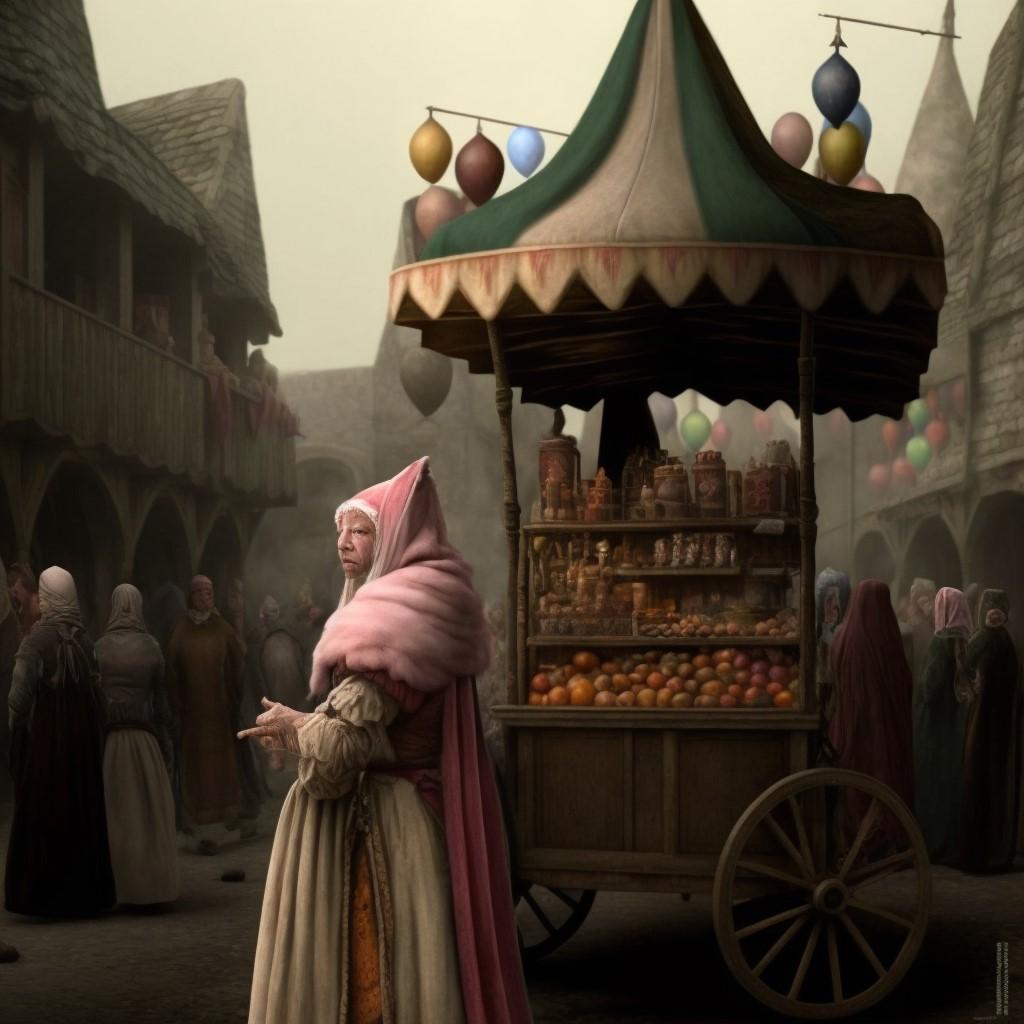
She quickly forgot what her quest was and set off wandering around the scene. Each alley led to a little square and each square had gaily coloured carts of wares for sale, and an abundance of grinning jesters and jugglers. Although tempted to linger and join the onlookers jeering and goading the jugglers and artistes that she encountered, Zara continued her ramble around the scene.
She came to a gathering outside an old market hall, where two particularly raucous jesters were trying to tempt the onlookers into partaking of what appeared to be cups of tea. Zara wondered what the joke was and why nobody in the crowd was willing to try. She inched closer, attracting the attention of the odd grinning fellow in the orange head piece.
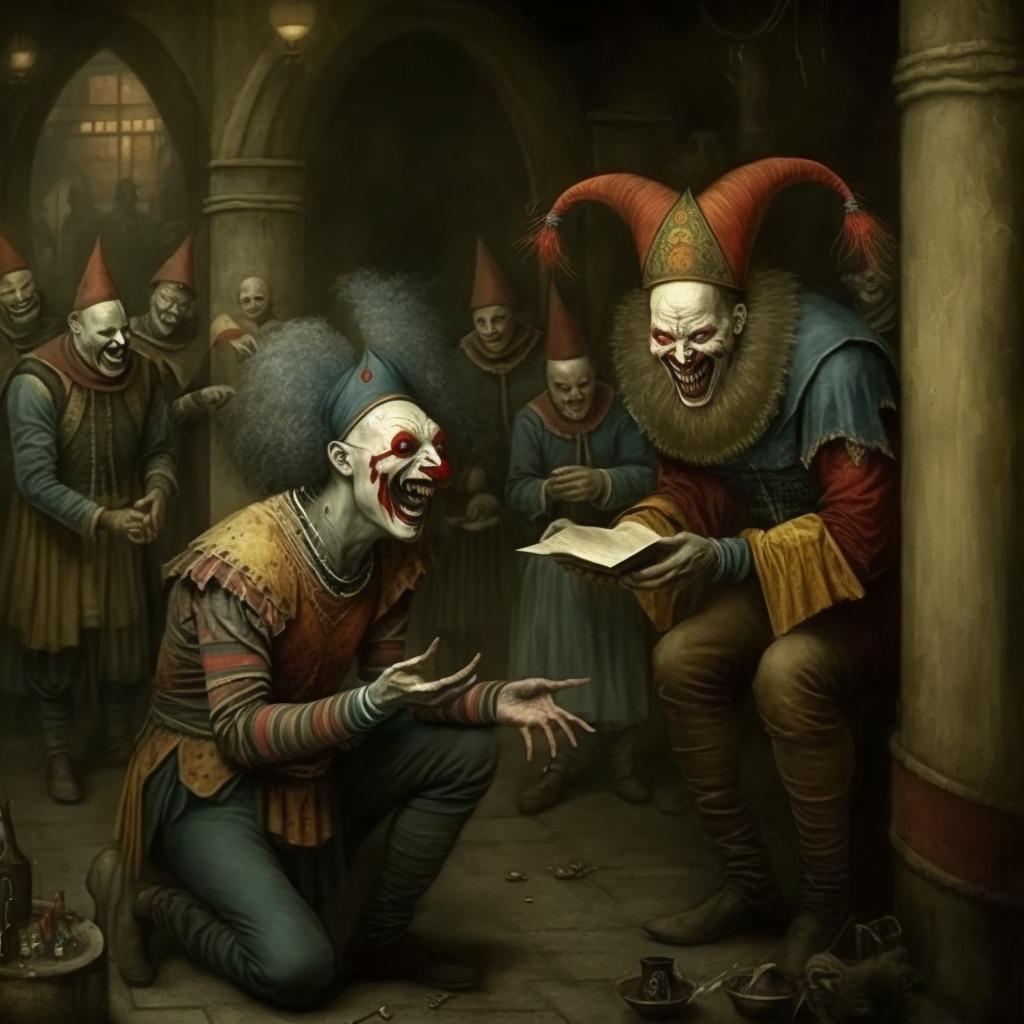
“Come hither, ye fine wench in thy uncomely scant garments, I know what thou seekest! Pray, sit thee down beside me and partake of my remedy.”
“Who, me?” asked Zara, looking behind her to make sure he wasn’t talking to someone else.
“Thoust in dire need of my elixir, come ye hither!”
Somewhat reluctantly Zara stepped towards the odd figure who was offering to hand her a cup. She considered the inadvisability of drinking something that everyone else was refusing, but what the hell, she took the cup and saucer off him and took a hesitant sip.
The crowd roared with laughter and there was much mirthful thigh slapping when Zara spit the foul tasting concoction all over the jesters shoes.
“Believe me dame,” quoth the Jester, “I perceive proffered ware is worse by ten in the hundred than that which is sought. But I pray ye, tell me thy quest.”
“My quest is none of your business, and your tea sucks, mister,” Zara replied. “But I like the cup.”
Pushing past the still laughing onlookers and clutching the cup, Zara spotted a tavern on the opposite side of the square and made her way towards it. A tankard of ale was what she needed to get rid of the foul taste lingering in her mouth.

The inside of the tavern was as much a madhouse as the streets outside it. What was everyone laughing at? Zara found a place to sit on a bench beside a long wooden table. She sat patiently waiting to be served, trying to eavesdrop to decipher the cause of such merriment, but the snatches of conversation made no sense to her. The jollity was contagious, and before long Zara was laughing along with the others. A strange child sat down on the opposite bench (she seemed familiar somehow) and Zara couldn’t help remarking, “You lot are as mad as a box of frogs, are you all on drugs or something?” which provoked further hoots of laughter, thigh slapping and table thumping.

“Ye be an ungodly rude maid, and ye’ll not get a tankard of ale while thoust leavest thy cup of elixir untasted yet,” the child said with a smirk.
“And you are an impertinent child,” Zara replied, considering the potential benefits of drinking the remainder of the concoction if it would hasten the arrival of the tankard of ale she was now craving. She gritted her teeth and picked up the cup.
But the design on the cup had changed, and now bore a strange resemblance to Xavier. Not only that, the cup was calling her name in Xavier’s voice, and the table thumping got louder.

“Zara!” Xavier was knocking on her bedroom door. “Zara! We’re going for a beer in the local tavern, are you coming?”
“Xavi!” Zara snapped back to reality, “Yes! I’m bloody parched.”
February 18, 2023 at 3:56 pm #6553In reply to: The Jorid’s Travels – 14 years on
Luckily for them, the sand structure with the nearby nests of snapping sand turtles was also a graveyard for the military drones that weren’t apparently programmed to register natural elements as threats.
They quickly found four of them who weren’t completely damaged, and with some technical assist from Jorid, Georges was able to repair the propulsion and deactivate the military programs and tracking beacons.
Klatu had some ropes in his speedster that they tied to their rudimentary drive and the drones, so they could carry Léonard’s body while he was still in stasis.
His vitals were generally positive, and Salomé kept checking on him, while Georges and Klatu managed attaching the odd assemblage of drones to their craft.
The ride back wasn’t as bad as the first time, maybe due to the extra cargo that made maneuvres more complex for their green driver.
“This is worth the detour. Seems like Klatu really wanted to save time and avoided to show us the scenic route the first time,” said Georges trying to break the tense worried silence.
Salomé smiled weakly “Léonard’s consciousness is embroiled into complex thoughts; they have to deal about some threat, the nature of which eludes me for now. It looks as though he’s absorbed some sort of forbidden knowledge, something potentially dangerous,” Salomé said to Georges. “I’m no longer as sure he was imprisoned for his punishment, but rather for protection…” she sighed. “for everyone else’s protection… I will feel better when we’re all back to the Jorid and we can run a full diagnosis.”
Georges looked at his friend apparently sleeping, and wrapped a loving arm around Salomé’s shoulder “It’s not going to be long now. He’s going to be fine.”

“Horrible doing business with you.” Klatu said as they parted, rubbing his hands together in gleeful satisfaction. Whatever the Jorid had organised as a deal for his payment, it seemed the added drones weren’t part of it and came as an extra bonus.

Inside the Jorid, while Salomé was setting up space for Léonard and making the preparation for the diagnosis, Georges looked at the tiles board, readying the craft for imminent departure.
A new tile had appeared, with a distinct pattern form, almost like an ogee.
“Jorid, is this new?”
“Indeed Georges, our adventure has inspired me to create new avenues of exploration.”
“Oh, that’s fresh.” Georges looked into the shifting symbol at its surface. After it stabilised, he could see there was a sort of spiral shell with forms reminiscent of the mocking turtles peeking out from the centre, surrounded by sand dunes.

“Jorid, tell me more please.”
“Sure, I’d call it ‘Sandshell‘. Do you want the full curriculum?”
“Absolutely, colour me intrigued!”
“The Sandshell:
Function: A reminder of the fragility of our perceived reality and the importance of questioning our assumptions
Families: Vold, Zuli, Ilda
Significance: The Sandshell represents the shifting and unstable nature of our beliefs, assumptions, and understandings. Like the sand that slips through our fingers, so too can our perception of the world around us be ephemeral and illusory. The image of the mock turtle serves as a reminder that we often live under assumed identities and in a world built on questionable foundations.
As advice: The Sandshell encourages one to question their beliefs and assumptions, to examine the foundations upon which they have built their reality, and to search for a deeper understanding of truth.
Depiction: The Sandshell can be depicted as a spiral shell with a mocking turtle peeking out from the center, surrounded by sand dunes. The sand symbolizes the instability of our perceptions and the turtle represents the assumed identities and neurotic fairy tales that make up our reality. The spiral form of the shell represents the journey of discovery and self-reflection.”“I love it,” said Georges enthusiastically “can we use it to plot our next course?”
“As a matter of fact we can Georges. Let me realign the grid and propose some suggestions. Do you have a seed thought to offer for this journey?”
Georges pondered for a while, when the image of the fishboard sprung forth in his mind. “Our little adventure is reminding me of our origins, Jorid —Léonard, working on the fishboard, your ancestor in a way… Us, finding Léonard… It feels like an adventure back to our origins. Can you project a destination on this vector…” then thinking at Salomé’s worried face “… that would be safe for our next stop, and allow us to find help for Léonard.”
“Verily.” Jorid answered back. “Course plotted. Please get comfortable until we arrive at our destination.”
February 11, 2023 at 9:16 am #6536In reply to: Orbs of Madjourneys
Youssef hadn’t changed a bit since they last met in real life. He definitely brought the bear in the bear hug he gave Xavier after Xavier had entered the soft sandal wood scented atmosphere of the Indian restaurant.
It was like there’d seen each other the day before, and conversation naturally flew without a thought on the few years’ hiatus between their last trip.
As they inquired about each other’s lives and events on the trip to get to Alice Springs, they ordered cheese nan, salted and mango lassi, a fish biryani and chicken tikka masala and a side thali for Youssef who was again ravenous after the jumpy ride. Soon after, the discussion turned to the road ahead.
“How long to the hostel?” asked Youssef, his mouth full of buns.
Xavier looked at his connected watch “It’s about 1 and half hour drive apparently. I called the number to check when to arrive, they told me to arrive before sunset… which I guess gives us 2-3 hours to visit around… I mean,” he looked at his friend “… we can also go straight there.”
Youssef nodded. He seemed to have had already enough of interactions in the past day.
Xavier continued “so it’s settled, we leave after we finish here. According to the landlady, it looks like Zara went off trekking, she didn’t seem too sure about Zara’s whereabouts. That would explain why we heard so little from her.”
Youssef laughed “If they don’t know Zara, I can bet they’ll be running around searching for her in the middle of the night.”
Xavier looked though the large window facing the street pensively. “I’m not sure I would want to get lost away from the beaten tracks here. There’s something so alien to the scale of it, and the dryness. Have you noticed we’re next to a river? I tried to have a look when I arrived, but it’s mostly dried up. And it’s supposed to be the wet season…”
Youssef didn’t reply, and turned to the leftovers of the biryani.
Despite the offering to top it off with gulab jamun and rose ice cream, it didn’t take too long to finish the healthy meal at the Indian restaurant. Youssef and Xavier went for the car.
“Here, catch!” Xavier threw the keys to Youssef. He knew his friend would have liked to drive; meanwhile he’d be able to catch on some emails and work stuff. After all, he was supposed to remote work for some days.
February 9, 2023 at 3:45 pm #6517In reply to: Orbs of Madjourneys
After Youssef retrieved his luggage in Alice Springs, he was swarmed with freelance tour guides trying to sell him trips. You would buy a ticket out of any one of them just to get rid of the others, he thought. With a few hungry growls, he managed to frighten most of them, with a touch of indifference he lost the rest. Except one. A short Indian looking man wearing a red cap and a moustache. He seemed to have an infinite talkative energy at his disposal, able to erode the strongest wills. The temperature was hotter than Youssef had expected, here it was the end of summer, and he was hungry. The man started to get on his nerves.
The list of tours was endless. Uluru, scenic bushwalking trails, beautiful gardens, a historical tour, a costumed historical tour, a few national parks, and even his cousins’ restaurant. He reminded Youssef of his own father, always offering guests (and especially his visiting kids) another fruit, a pastry, some coffee, chocolate ? You sure you don’t want any chocolate? If the man was tenacious, Youssef had had training with his father. But this man seemed to mistake silence and indifference for agreement. Did he really think Youssef was going to buy one of his tours ?
“The ghost town! You have to see Arltunga, said the man. An old mining ghost town, certainly an American like you like ghost towns. And buried treasure. Arltunga has buried treasure somewhere. You can find it. I know where to find a map.”
Youssef wondered if it was another one of the game’s fluke that his quest was apparently bleeding into his real life again. And if there was a map, why hasn’t the treasure been found already? He checked at the back of his mind for the presence of that crazy old lady. Nope, not there. He decided to refuse the call this time. He just wanted to get to that F…ing Fish Inn in Crowshollow and meet with his friends.
“NO, he growled, frightening a group of tourists passing by, but not the tour operator. No ghost town! We have plenty in America.” Thinking of the game and his last challenge for the previous quest, he said in desperation : “I just want to find a red scarf!” and he knew inside himself and many years attempting to resist his old man, that the short Indian man had won.
“If you want to find a red scarf, you go to Silk Road, said the man bobbing his head. My cousin’s shop, you find everything there only.”
Youssef sighed. He thought there were only two ways to take it. The first one was that he had fallen into a trap and try to find a way to get out of it. But it might be sticky and uncomfortable for everyone. So he decided it was the other way around and that it was part of the game. Why wouldn’t he use this as an opportunity for adventure. Wasn’t that what Xavier always said about roads less traveled ?
“Where is your cousin’s shop? he asked. And where’s that restaurant of your cousin’s? I’m starving.”
The little man smiled broadly.
“Same place. Two brothers. Shop next to restaurant in Todd Mall. You’re lucky! Follow me.”
February 8, 2023 at 10:27 pm #6515In reply to: Prompts of Madjourneys
Yasmin offered the following quirk: “sounding like a lunatic when I share synchs” (synchronicity) – getting excited when she gets “answers”, and willing to share generously. She wouldn’t fake it, as she’s not capable of lying and stuff like synchs are sacrosanct in her mind.
Setting for the game is the next random quote from the story.Quirk accepted.
In the Land of Quirk, Yasmin finds herself in the heart of a hidden library, deep in the basement of the Flying Fish Inn. The library is filled with books and artifacts related to the study of synchronicities and the beyond.
As Yasmin delves deeper into the library, she comes across an ancient book that seems to hold the secrets of the universe. She eagerly opens it, but finds that it is written in a code that she cannot understand.
The librarian, a wise old owl, appears and greets Yasmin. He tells her that the book is the Key to the Beyond and that only the purest of heart can decode it. He explains that the code can only be unlocked by finding the missing pieces of a puzzle scattered throughout the library.
Yasmin’s task is to find the missing pieces of the puzzle and put them together to unlock the code. Along the way, she will meet various characters who will provide her with clues and challenges.
Proof of completion in real life: Yasmin must find a real-life object that relates to a synchronicity that she experiences while on her quest in the Land of Quirk. She must then share this synchronicity with her friends at the Flying Fish Inn to prove that she has completed her quest.
Good luck, Yasmin!
February 8, 2023 at 10:08 pm #6514In reply to: Prompts of Madjourneys
Xavier offered the following quirk: “being the holder of continuity”
Quirk accepted.
Your quest takes place in the ghost town of Midnight, where time seems to have stood still. The townspeople are all frozen in time, stuck in their daily routines and unable to move on. Your mission is to find the missing piece of continuity, a small hourglass that will set time back in motion and allow the townspeople to move forward.
The clue to finding the hourglass lies within a discarded pocket watch that can be found in the mayor’s office. You must unscrew the back and retrieve a hidden key. The key will unlock a secret compartment in the town clock tower, where the hourglass is kept.
Be careful as you search for the hourglass, as the town is not as abandoned as it seems. Spectral figures roam the streets, and strange whispers can be heard in the wind. You may also encounter a mysterious old man who seems to know more about the town’s secrets than he lets on.
Proof of completion can be shown by taking a photo of the hourglass and the pocket watch, and sending it to the game’s creators.
Good luck!
February 8, 2023 at 10:06 pm #6513In reply to: Prompts of Madjourneys
Youssef offered the following quirk: “unwilling magnet for talkative people in need of listening” (setting in a ghost town).
Setting: A small ghost town in the middle of the Australian outback. The town was once thriving but now only a few stragglers remain, living in old, decrepit buildings. You find yourself in the town square, surrounded by the old post office, the saloon, and a few other ramshackle buildings.
Quest: Your task is to find the source of the magnetic pull that attracts talkative people to you. You must find the reason behind it and break the spell, so you can continue your journey in peace.
Direction to investigate: Start by talking to the residents of the town, they may have some information or insights on the strange happenings in the town. Explore the old post office and the saloon, they might hold the key to breaking the spell.
Characters to engage: The residents of the town, including the old timer at the saloon and the postmaster at the post office.
Tile to look for: A silver key in the shape of a tongue, symbolizing the power of speech.
Proof of insert in real life: Take a picture of yourself holding the key, and send it to the game master as proof of completion.
February 7, 2023 at 10:43 pm #6512In reply to: Prompts of Madjourneys
Zara offered the following quirk: “unleash my hidden rudeness”
Quirk accepted.
You find yourself in the bustling streets of an old medieval town. The people around you are going about their business, and you see vendors selling goods, street performers entertaining the crowd, and guards patrolling the area. You hear rumors about a secret society of mischievous tricksters who are known for causing trouble and making people’s lives more interesting.
You decide to investigate these rumors and join the society of tricksters, who call themselves the “Rude Ones.” You are tasked with finding the key to their hideout, a tile with a rude message written on it. To do this, you must complete several challenges and pranks around the town, each more mischievous than the last.
Your objective is to find the tile, sneak into the Rude Ones’ hideout, and cause as much chaos and trouble as possible. You must also find a way to insert a real-life prank or act of rudeness into your daily life, as proof of your success in the game.
Possible directions to investigate:
- Talk to the vendors and street performers to gather information about the Rude Ones.
- Observe the guards and see if they have any information on the secret society.
- Explore the different neighborhoods and see if anyone knows about the hideout.
Possible characters to engage:
- A mysterious street performer who is rumored to be part of the Rude Ones.
- A vendor who has a reputation for being rude to customers.
- A guard who is rumored to be in league with the Rude Ones.
Look for a tile with a rude message written on it, and capture proof of your real-life prank or act of rudeness. Good luck, and have fun!
February 7, 2023 at 8:51 pm #6507In reply to: Orbs of Madjourneys
To Youssef’s standards, a plane was never big and Flight AL357 was even smaller. When he found his seat, he had to ask a sweaty Chinese man and a snorting woman in a suit with a bowl cut and pink almond shaped glasses to move out so he could squeeze himself in the small space allotted to economy class passengers. On his right, an old lady looked at the size of his arms and almost lost her teeth. She snapped her mouth shut just in time and returned quickly to her magazine. Her hands were trembling and Youssef couldn’t tell if she was annoyed or something else.
The pilote announced they were ready to leave and Youssef sighed with relief. Which was short lived when he got the first bump on the back of his seat. He looked back, apologising to the woman with the bowl cut on his left. Behind him was a kid wearing a false moustache and chewing like a cow. He was swinging his tiny legs, hitting the back of Youssef’s seat with the regularity of a metronome. The kid blew his gum until the bubble exploded. The mother looked ready to open fire if Youssef started to complain. He turned back again and tried to imagine he was getting a massage in one of those Japanese shiatsu chairs you find in some airports.
The woman in front of him had thrown her very blond hair atop her seat and it was all over his screen. The old lady looked at him and offered him a gum. He wondered how she could chew gums with her false teeth, and kindly declined. The woman with the bowl cut and pink glasses started to talk to her sweaty neighbour in Chinese. The man looked at Youssef as if he had been caught by a tiger and was going to get eaten alive. His eyes were begging for help.
As the plane started to move, the old woman started to talk.
« Hi, I’m Gladys. I am afraid of flying, she said. Can I hold your hand during take off ? »
After another bump on his back, Youssef sighed. It was going to be a long flight for everyone.
As soon as they had gained altitude, Youssef let go of the old woman’s hand. She hadn’t stopped talking about her daughter and how she was going to be happy to see her again. The flight attendant passed by with a trolley and offered them a drink and a bag of peanuts. The old woman took a glass of red wine. Youssef was tempted to take a coke and dip the hair of the woman in front of him in it. He had seen a video on LooTube recently with a girl in a similar situation. She had stuck gum and lollypops in the hair of her nemesis, dipped a few strands in her soda and clipped strands randomly with her nail cutter. He could ask the old woman one of her gums, but thought that if a girl could do it, it would certainly not go well for him if he tried.
Instead he asked the flight attendant if there was wifi on board. Sadly there was none. He had hoped at least the could play the game and catch up with his friends during that long flight to Sydney.

When the doors opened, Youssef thought he was free of them all. He was tired, his back hurt, and he couldn’t sleep because the kid behind him kept crying and kicking, the food looked like it had been regurgitated twice by a yak, and the old chatty woman had drained his batteries. She said she wouldn’t sleep on a plane because she had to put her dentures in a glass for hygiene reasons and feared someone would steal them while she had her eyes closed.
He walked with long strides in the corridors up to the custom counters and picked a line, eager to put as much distance between him and the other passengers. Xavier had sent him a message saying he was arriving in Sydney in a few hours. Youssef thought it would be nice to change his flight so that they could go together to Alice Spring. He could do some time with a friend for a change.
His bushy hair stood on end when he heard the voice of the old woman just behind him. He wondered how she had managed to catch up so fast. He saw a small cart driving away.
« I wanted to tell, Gladys said, it was such a nice flight in your company. How long have you before your flight to Alice? We can have a coffee together. »
Youssef mentally said sorry to his friend. He couldn’t wait for the next flight.
February 6, 2023 at 10:44 pm #6500More developments
Chapter 3: The Journey becomes more eggciting
The Flovlinden Tree
The group reaches the Flovlinden Tree, a massive linden tree in the heart of Oocrane, which is said to be sacred and is attracting crowds of pilgrims.
They meet Olek, the old caretaker of the tree, who tells them the story of Saint Edigna. He explains how the tree is said to have magical healing properties, and how the tree is responsible for the sacred oil that the pilgrims come to collect.
However, Olek reveals that the secret of Saint Edigna is not what it seems. Edna, an old woman who has been living far from the crowd for thousands of years, is actually Saint Edigna.
Olek shares that Edna has been living in solitude for very long. He tells the group that if they want to learn more about the sacred tree and Edna, they must travel to her hidden home.
The four friends were shocked to hear that Edna was still alive and wanted to meet her. They asked Olek for directions, and he gave them a map that showed the way to Edna’s remote dwelling.
They bid farewell to Olek and set off on their journey to find Edna.A Run-In with Myroslava
The group comes across a former war reporter, Myroslava, who is traveling on her own after leaving a group of journalists. She is being followed by mysterious individuals and is trying to lose them by hunting and making fire in bombed areas.
Myroslava is frustrated and curses her lack of alcohol, wishing she could find a place to escape from her pursuers.
The group approaches Myroslava and offers to help her. She joins forces with them and together, they set off on their journey.
As they travel, Myroslava shares her experiences as a war reporter, and the group listens in awe. She explains how she has seen the worst of humanity, but also the best, and how it has changed her as a person.
Myroslava and the group continue their journey, with the former reporter becoming more and more determined to shake off her pursuers and continue on her own.A Visit with Eusebius Kazandis’ Relatives
The group reaches a small village where they are expected by relatives of Eusebius Kazandis, the cauldron seller that Rose has met at the Innsbruck fair.
The relatives tell the group about Kazandis and his business, and how he has been traveling the world, selling his wares. They explain how he has become a legend in their village, and how proud they are of him.
The group learns about Kazandis’ passion for cooking and how he uses his cauldrons to create delicious meals for his customers. They are also shown his secret recipe book, which has been passed down for generations.
The relatives invite the group to try some of Kazandis’ famous dishes, and they are blown away by the delicious flavors.
The group thanks the relatives for their hospitality and sets off on their journey, with a newfound appreciation for Kazandis and his love of cooking.A Surprising Encounter with Edna
The group finally reaches Edna’s hidden home, a small cottage in the middle of a dense forest.
As they approach the cottage, they are surprised to see Edna, who is actually the legendary Saint Edigna, standing outside, waiting for them.The four friends have finally arrived at Edna’s dwelling, where they learned about her vast knowledge of the families connected to her descendants. Edna showed them her books, and they were amazed to find that their own family was listed among her descendants. They were even more shocked to learn that they were related to President Voldomeer Zumbasky and Dumbass Voldomeer, who was said to be a distant relative and carpenter who made the President’s wooden leg. It was rumored that they shared a common ancestor, but in reality, they were possibly secret twins.
The Secret of Dumbass Voldomeer
The four friends were determined to find out more about Dumbass Voldomeer and his connection to their family. They learned that he lived in the small city of Duckailingtown in Dumbass, near the Rootian border. They also discovered that Dumbass Voldomeer had been enrolled to take the place of the President, who had succumbed from a mysterious swan flu virus, to which Dumbass Voldomeer was immune. As they set to Duckailingtown, they couldn’t help but wonder what other secrets and surprises lay ahead for them on this incredible journey.
January 26, 2023 at 12:16 am #6460In reply to: Orbs of Madjourneys
The vendor was preparing the Lorgh Drülp with the dexterity of a Japanese sushi chef. A piece of yak, tons of spices, minced vegetables, and some other ingredients that Youssef couldn’t recognise. He turned his attention to the shaman’s performance. The team was trying to follow the man’s erratic moves under Miss Tartiflate’s supervision. Youssef could hear her shouting to Kyle to get closer shots. It reminded him that he had to get an internet connection.
“Is there a wifi?” asked Youssef to the vendor. The man bobbed his head and pointed at the table with a knife just as big as a machete. Impressed by the size of the blade, Youssef almost didn’t see the tattoo on the vendor’s forearm. The man resumed his cooking swiftly and his long yellow sleeve hid the tattoo. Youssef touched his screen to look at his exchange with Xavier. He searched for the screenshot he had taken of the Thi Gang’s message. There it was. The mummy skull with Darth Vador’s helmet. The same as the man’s tattoo. Xavier’s last message was about the translation being an ancient silk road recipe. They had thought it a fluke in AL’s algorithm. Youssef glanced at the vendor and his knife. Could he be part of Thi Gang?
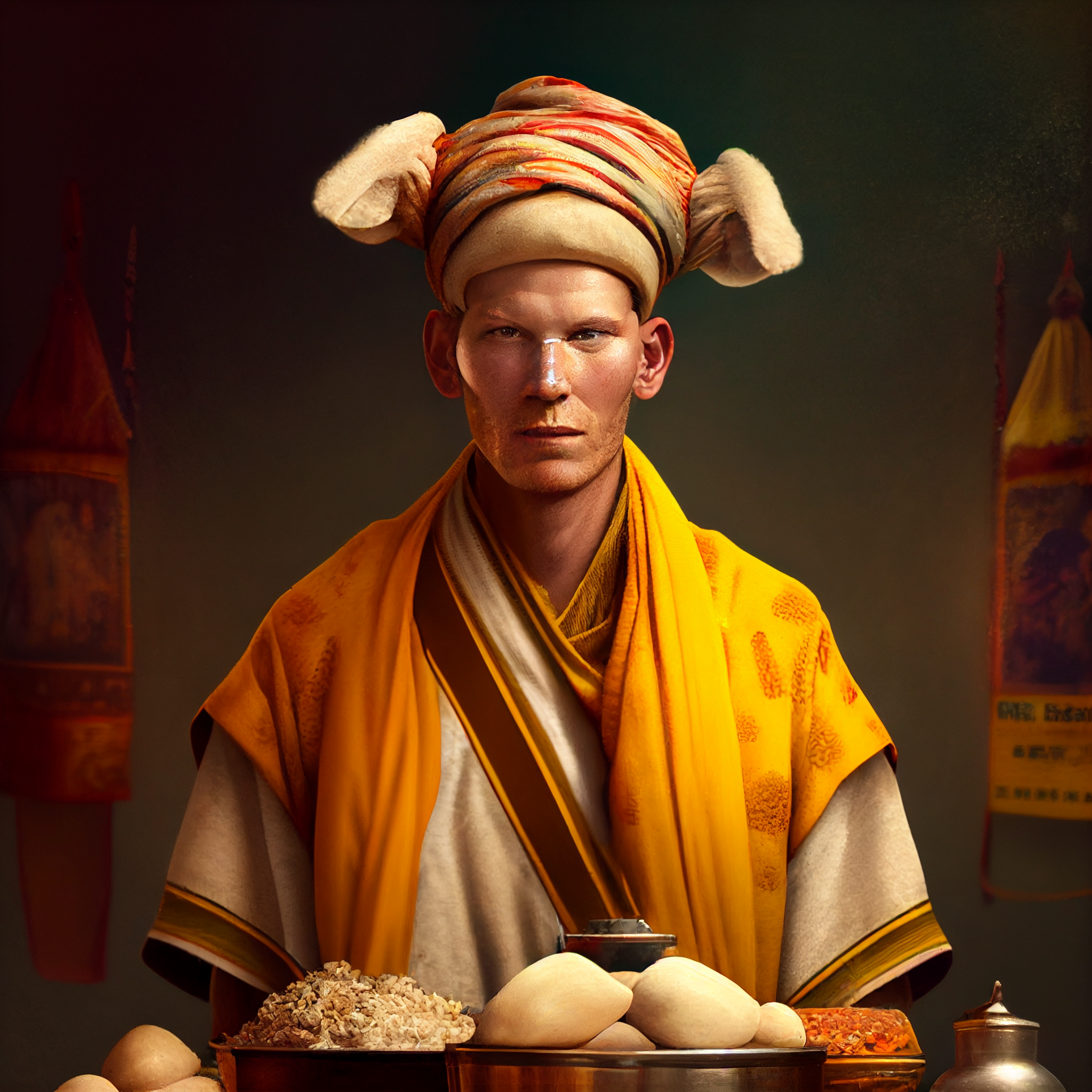
Youssef didn’t have time to think of a plan when the vendor put a tray with the Lorgh Drülp and little balls of tsampa on the table. The man pointed with his finger at the menu on the table, uncovering his forearm, it was the same as the Thi Gang logo.
“Wifi on menu,” the man said. “Tsampa, good for you…”
A commotion at the market place interrupted them. Apparently Kyle had gone too close and the shaman had crashed into him and the rest of the team. The man was cursing every one of them and Miss Tartiflate was apparently trying to calm him down by offering him snack bars. But the shaman kept brandishing an ugly sceptre that looked like a giant chicken foot covered in greasy fur, while cursing them with broken english. The tourists were all brandishing their phones, not missing a thing, ready to send their videos on TrickTruck. The shaman left angrily, ignoring all attempts at conciliation. There would be no reportage.
“Hahaha, tourists, they believe anything they see,” said the vendor before returning to his stove and his knife.

Despite his hunger, Youssef thought he’d better hurry with the wifi, now that the crew was out of work, he would be the target of Miss Tartiflate’s frustration. Furthermore, he wanted to lay low and not attract the vendor’s attention.
3235 messages from his friends. How would he ever catch up?
Among them, messages from Xavier. Youssef sighed of relief when he read that his friend had regained full access of the website and updated the system to fix a security flaw that allowed Thi Gang to gain access in the first place. But he growled when his friend continued with the bad news. There was some damage done to the content of THE BLOG.To console himself, Youssef started to eat a ball of tsampa. It was sweet and tasted like rose. He took a second and spit it out almost immediately. There was a piece of paper inside. He smoothed it and discovered a series of five pictograms.
🧔🌮🔍🔑🏞️
The first one was like a hologram and kept changing into six horizontal bars. The second one, looking like a tako bell, kept reversing side. Youssef raised his head to call the vendor and nobody was there. He got up and looked for the guy, Thi Gang or not, he needed some answers. Voices came from behind the curtain at the back of the stall. Youssef walked around the stall and saw the shaman and the vendor exchanging clothes. The caucasian man was now wearing the colourful costume and the drum. When he saw Youssef, he smiled and waved his hand, making the bells from the hem ring. Then he turned around and left, whistling an air that sounded strangely like the music of the Game. Youssef was about to run after him when a hand grasped his shirt.
“Please! Tell me at least that THE BLOG is up and running!” said an angry voice.
January 24, 2023 at 11:59 pm #6459In reply to: Orbs of Madjourneys
It was pretty late, but Xavier remembered he had to book his flight (and his holidays, even if he could still mix the trip with his job… it would depend if Brytta would be able to join or not; if such were the case, he’d definitely would book time off).
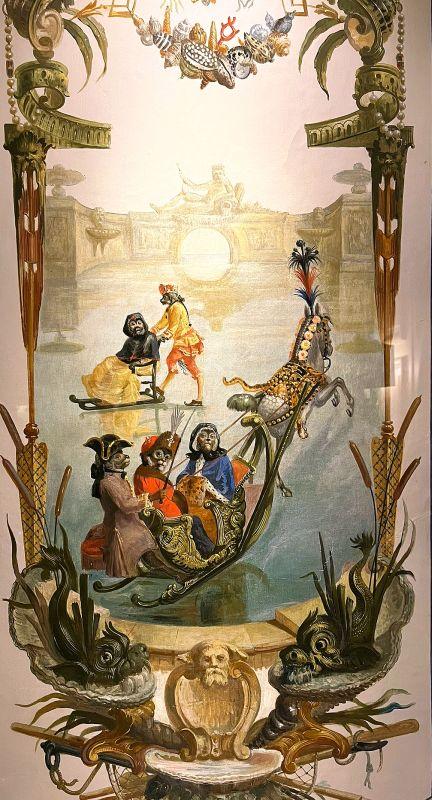 At the hotel where he was staying for the 2-days business trip he had to attend for his job, he’d noticed the strange decor, with little people in costumes in odd sceneries patterned on the “Toile de Jouy” curtains and some others in the most curious framed paintings, many of them looked like actual monkeys. Curiously, there wasn’t any golden banana, or banana bus, but it made him wonder if there was something more to be looked at the Inn that Zara wanted them to go to.
At the hotel where he was staying for the 2-days business trip he had to attend for his job, he’d noticed the strange decor, with little people in costumes in odd sceneries patterned on the “Toile de Jouy” curtains and some others in the most curious framed paintings, many of them looked like actual monkeys. Curiously, there wasn’t any golden banana, or banana bus, but it made him wonder if there was something more to be looked at the Inn that Zara wanted them to go to.Yasmin, a step ahead of him, had already looked at the reviews on MadjourneyAdvisor, and they were rave… in a fashion…
“The lady behind the bar is nearly 90 years old and believe me, she could out-work many much younger than her.”
“Old bird behind the bar is a lovely lady drop in for a chat and a beer or two – don’t mess with her or you will end up down a mine shaft”Well… better not to overthink it. He started to look at the flights, and last minute offers.
Still no word from Youssef either.
He placed an option on a flight, and decided he’d wait for everyone to confirm the dates for the rendez-vous.
January 21, 2023 at 5:50 pm #6427In reply to: Prompts of Madjourneys
Xavier’s quirk offering is being a cheeky monkey
Quirk accepted.
The initial setting for Xavier’s quest is a lush jungle filled with mischievous monkeys. Your mission is to find the legendary Golden Banana, which is said to grant eternal youth and vitality to whoever finds it. However, be warned as the jungle is also home to a tribe of fierce apes who will stop at nothing to protect the precious fruit.
Possible directions to investigate include
- searching for clues in the monkey’s sacred temples hidden deep within the jungle,
- or seeking out the help of a wise old owl who is said to know the location of the Golden Banana.
As for possible characters to engage, you may come across
- a sly fox who claims to know the location of the fruit but will only reveal it in exchange for a favor,
- or a brave adventurer who has been searching for the Golden Banana for years and may be willing to team up with you.
In regards to the FFI visit in real-life, you may discover a mysterious map hidden within the Inn that leads to the location of the Golden Banana, or overhear a conversation between the Inn’s patrons discussing rumors of a monkey who recently visited and may hold valuable information about the quest.
Emoji clue: Xavier: 🐒🍌
January 21, 2023 at 11:26 am #6423In reply to: Prompts of Madjourneys
Zara’s first quest:
entry level quirk: wandering off the track
The initial setting for this quest is a dense forest, where the paths are overgrown and rarely traveled. You find yourself alone and disoriented, with only a rough map and a compass to guide you.
Possible directions to investigate include:
Following a faint trail of footprints that lead deeper into the forest
Climbing a tall tree to get a better view of the surrounding area
Searching for a stream or river to use as a guide to find your way out of the forest
Possible characters to engage include:
A mysterious hermit who lives deep in the forest and is rumored to know the secrets of the land
A lost traveler who is also trying to find their way out of the forest
A group of bandits who have taken refuge in the forest and may try to steal from you or cause harm
Your objective is to find the Wanderlust tile, a small, intricately carved wooden tile depicting a person walking off the beaten path. This tile holds the key to unlocking your inner quirk of wandering off the track.
As proof of your progress in the game, you must find a way to incorporate this quirk into your real-life actions by taking a spontaneous detour on your next journey, whether it be physical or mental.
For Zara’s quest:
As you wander off the track, you come across a strange-looking building in the distance. Upon closer inspection, you realize it is the Flying Fish Inn. As you enter, you are greeted by the friendly owner, Idle. She tells you that she has heard of strange occurrences happening in the surrounding area and offers to help you in your quest
Emoji clue: 🐈🌳

Zara (the character in the game)
characteristics from previous prompts:
Zara is the leader of the group
 she is confident, and always ready for an adventure. She is a natural leader and has a strong sense of justice. She is also a tech-savvy person, always carrying a variety of gadgets with her, and is always the first to try out new technology.
she is confident, and always ready for an adventure. She is a natural leader and has a strong sense of justice. She is also a tech-savvy person, always carrying a variety of gadgets with her, and is always the first to try out new technology.Zara is the leader of the group, her color is red, her animal is a lion, and her secret name in a funny language is “Zaraloon”
Zara (the real life story character)
characteristics from previous prompts:
Zara Patara-Smythe is a 57-year-old woman of mixed heritage, her mother is Indian and her father is British. She has long, dark hair that she keeps in an untidy ponytail, dark brown eyes and a sharp jawline. She stands at 5’6″ and has a toned and athletic build. She usually wears practical clothing that allows her to move around easily, such as cargo pants and a tank top.
prompt quest:
Continue to investigate the mysterious cat she saw, possibly seeking out help from local animal experts or veterinarians.
Join Xavier and Yasmin in investigating the Flying Fish Inn, looking for clues and exploring the area for any potential leads on the game’s quest.January 17, 2023 at 11:02 pm #6411In reply to: Prompts of Madjourneys
Continuing their adventures, offer 2 possible choices of action to each of the characters in real-life: 2 for Zara, 2 for Xavier, 2 for Yasmin and 2 for Youssef in “choose your own adventure” style.
Zara:
- Continue to investigate the mysterious cat she saw, possibly seeking out help from local animal experts or veterinarians.
- Join Xavier and Yasmin in investigating the Flying Fish Inn, looking for clues and exploring the area for any potential leads on the game’s quest.
Xavier:
- Help Youssef troubleshoot the issues with the blog, possibly reaching out to IT professionals for assistance.
- Join Zara and Yasmin in investigating the Flying Fish Inn, using his knowledge of RPG’s and fantasy literature to assist in the search for clues.
Yasmin:
- Take a break from the game and focus on her personal creative projects, such as writing or painting.
- Join Zara and Xavier in investigating the Flying Fish Inn, using her skills in research and analysis to assist in the search for clues.
Youssef:
- Focus on resolving the issues with the blog, possibly seeking out help from a hacker or cybersecurity expert to uncover the source of the problem.
- Join Zara, Xavier and Yasmin in investigating the Flying Fish Inn, using his knowledge of the game and the AI technology behind it to assist in the search for clues.
January 11, 2023 at 10:32 pm #6368In reply to: Train your subjective AI – text version
Something in the style of FPooh:
Arona heard the music growing louder as she approached the source of the sound. She could see a group of people gathered around a large fire, the flickering light casting shadows on the faces of the dancers. She hesitated for a moment, remembering the isolation of her journey and wondering if she was ready to be among people again. But the music was too inviting, and she found herself drawn towards the group.
As she neared the fire, she saw a young man playing a flute, the music flowing from his fingers with a fluid grace that captivated her. He looked up as she approached, and their eyes met. She could see the surprise and curiosity in his gaze, and she smiled, feeling a sense of connection she had not felt in a long time.
Fiona was sitting on a bench in the park, watching the children play. She had brought her sketchbook with her, but for once she didn’t feel the urge to draw. Instead she watched the children’s laughter, feeling content and at peace. Suddenly, she saw a young girl running towards her, a look of pure joy on her face. The girl stopped in front of her and held out a flower, offering it to Fiona with a smile.
Taken aback, Fiona took the flower and thanked the girl. The girl giggled and ran off to join her friends. Fiona looked down at the flower in her hand, and she felt a sense of inspiration, like a spark igniting within her. She opened her sketchbook and began to draw, feeling the weight lift from her shoulders and the magic of creativity flowing through her.
Minky led the group of misfits towards the emporium, his bowler hat bobbing on his head. He chattered excitedly, telling stories of the wondrous items to be found within Mr Jib’s store. Yikesy followed behind, still lost in his thoughts of Arona and feeling a sense of dread at the thought of buying a bowler hat. The green fairy flitted along beside him, her wings a blur of movement as she chattered with the parrot perched on her shoulder.
As they reached the emporium, they were disappointed to find it closed. But Minky refused to be discouraged, and he led them to a nearby cafe where they could sit and enjoy some tea and cake while they wait for the emporium to open. The green fairy was delighted, and she ordered a plate of macarons, smiling as she tasted the sweetness of the confections.
About creativity & everyday magic
Fiona had always been drawn to the magic of creativity, the way a blank page could be transformed into a world of wonder and beauty. But lately, she had been feeling stuck, unable to find the spark that ignited her imagination. She would sit with her sketchbook, pencil in hand, and nothing would come to her.
She started to question her abilities, wondering if she had lost the magic of her art. She spent long hours staring at her blank pages, feeling a weight on her chest that seemed to be growing heavier every day.
But then she remembered the green fairy’s tears and Yikesy’s longing for Arona, and she realized that the magic of creativity wasn’t something that could be found only in art. It was all around her, in the everyday moments of life.
She started to look for the magic in the small things, like the way the sunlight filtered through the trees, or the way a child’s laughter could light up a room. She found it in the way a stranger’s smile could lift her spirits, and in the way a simple cup of tea could bring her comfort.
And as she started to see the magic in the everyday, she found that the weight on her chest lifted and the spark of inspiration returned. She picked up her pencil and began to draw, feeling the magic flowing through her once again.
She understand that creativity blocks aren’t a destination, but just a step, just like the bowler hat that Minky had bought for them all, a bit of everyday magic, nothing too fancy but a sense of belonging, a sense of who they are and where they are going. And she let her pencil flow, with the hopes that one day, they will all find their way home.
January 10, 2023 at 10:15 pm #6363In reply to: Train your subjective AI – text version
try another short story, with a bit of drama with the following words:
road form charlton smooth everyone cottage hanging rush offer agree subject district included appear sha returning grattidge nottingham 848 tetbury chicken
It was a cold and gloomy day in the small village of Tetbury, nestled in the picturesque Cotswolds district. A young woman named Sha was returning home to her cottage after a long and tiring journey. She had been away visiting her family in Nottingham and was looking forward to relaxing in her cozy home.
As she walked down the dirt road that led to her cottage, she couldn’t help but notice that something was off. Her neighbor, Mr. Charlton, was outside hanging laundry and he didn’t acknowledge her as she walked by. Sha thought it was strange, as he was usually a friendly and sociable person.
When Sha arrived at her cottage, she was shocked to find that it had been broken into. The front door was ajar and the inside of her home had been ransacked. Sha immediately panicked and called the police, who arrived on the scene shortly thereafter.
The police officers, including Inspector Grattidge, took Sha’s statement and began to investigate the crime. They discovered that a group of burglars had been operating in the area, targeting homes and businesses in the district. The burglars had been known for their smooth operations and their ability to strike quickly, which led to their nickname “The Smooth Operators”.
As Sha waited for the police to finish their investigation, she couldn’t shake the feeling that something was not right. She had always thought of Tetbury as a safe and friendly place, and she couldn’t believe that something like this could happen in her community.
As the investigation went on, the police found out that the Smooth operators have been targeting houses with no security cameras, but Sha’s cottage was an exception, the police were able to find out that the group offered to pay a considerable sum of money to the people who reported the locations of the houses that had no cameras, and it was Mr. Charlton who was the informant and he even rushed to Sha’s cottage as soon as he knew the police was investigating the case, He was arrested for the crime and Sha was heartbroken to find out that her once friendly neighbor had betrayed her.
Feeling violated and betrayed, Sha decided that she could no longer stay in the village and she put her cottage up for sale. She packed up her belongings and moved away, leaving behind the memories of her peaceful home and the community she had once thought of as her own. The end.
November 18, 2022 at 4:47 pm #6348In reply to: Family Stories From The Other Side ~ Book Two
Wong Sang
Wong Sang was born in China in 1884. In October 1916 he married Alice Stokes in Oxford.
Alice was the granddaughter of William Stokes of Churchill, Oxfordshire and William was the brother of Thomas Stokes the wheelwright (who was my 3X great grandfather). In other words Alice was my second cousin, three times removed, on my fathers paternal side.
Wong Sang was an interpreter, according to the baptism registers of his children and the Dreadnought Seamen’s Hospital admission registers in 1930. The hospital register also notes that he was employed by the Blue Funnel Line, and that his address was 11, Limehouse Causeway, E 14. (London)
“The Blue Funnel Line offered regular First-Class Passenger and Cargo Services From the UK to South Africa, Malaya, China, Japan, Australia, Java, and America. Blue Funnel Line was Owned and Operated by Alfred Holt & Co., Liverpool.
The Blue Funnel Line, so-called because its ships have a blue funnel with a black top, is more appropriately known as the Ocean Steamship Company.”Wong Sang and Alice’s daughter, Frances Eileen Sang, was born on the 14th July, 1916 and baptised in 1920 at St Stephen in Poplar, Tower Hamlets, London. The birth date is noted in the 1920 baptism register and would predate their marriage by a few months, although on the death register in 1921 her age at death is four years old and her year of birth is recorded as 1917.
Charles Ronald Sang was baptised on the same day in May 1920, but his birth is recorded as April of that year. The family were living on Morant Street, Poplar.
James William Sang’s birth is recorded on the 1939 census and on the death register in 2000 as being the 8th March 1913. This definitely would predate the 1916 marriage in Oxford.
William Norman Sang was born on the 17th October 1922 in Poplar.
Alice and the three sons were living at 11, Limehouse Causeway on the 1939 census, the same address that Wong Sang was living at when he was admitted to Dreadnought Seamen’s Hospital on the 15th January 1930. Wong Sang died in the hospital on the 8th March of that year at the age of 46.
Alice married John Patterson in 1933 in Stepney. John was living with Alice and her three sons on Limehouse Causeway on the 1939 census and his occupation was chef.
Via Old London Photographs:
“Limehouse Causeway is a street in east London that was the home to the original Chinatown of London. A combination of bomb damage during the Second World War and later redevelopment means that almost nothing is left of the original buildings of the street.”
Limehouse Causeway in 1925:

From The Story of Limehouse’s Lost Chinatown, poplarlondon website:
“Limehouse was London’s first Chinatown, home to a tightly-knit community who were demonised in popular culture and eventually erased from the cityscape.
As recounted in the BBC’s ‘Our Greatest Generation’ series, Connie was born to a Chinese father and an English mother in early 1920s Limehouse, where she used to play in the street with other British and British-Chinese children before running inside for teatime at one of their houses.
Limehouse was London’s first Chinatown between the 1880s and the 1960s, before the current Chinatown off Shaftesbury Avenue was established in the 1970s by an influx of immigrants from Hong Kong.
Connie’s memories of London’s first Chinatown as an “urban village” paint a very different picture to the seedy area portrayed in early twentieth century novels.
The pyramid in St Anne’s church marked the entrance to the opium den of Dr Fu Manchu, a criminal mastermind who threatened Western society by plotting world domination in a series of novels by Sax Rohmer.
Thomas Burke’s Limehouse Nights cemented stereotypes about prostitution, gambling and violence within the Chinese community, and whipped up anxiety about sexual relationships between Chinese men and white women.
Though neither novelist was familiar with the Chinese community, their depictions made Limehouse one of the most notorious areas of London.
Travel agent Thomas Cook even organised tours of the area for daring visitors, despite the rector of Limehouse warning that “those who look for the Limehouse of Mr Thomas Burke simply will not find it.”
All that remains is a handful of Chinese street names, such as Ming Street, Pekin Street, and Canton Street — but what was Limehouse’s chinatown really like, and why did it get swept away?
Chinese migration to Limehouse
Chinese sailors discharged from East India Company ships settled in the docklands from as early as the 1780s.
By the late nineteenth century, men from Shanghai had settled around Pennyfields Lane, while a Cantonese community lived on Limehouse Causeway.
Chinese sailors were often paid less and discriminated against by dock hirers, and so began to diversify their incomes by setting up hand laundry services and restaurants.
Old photographs show shopfronts emblazoned with Chinese characters with horse-drawn carts idling outside or Chinese men in suits and hats standing proudly in the doorways.
In oral histories collected by Yat Ming Loo, Connie’s husband Leslie doesn’t recall seeing any Chinese women as a child, since male Chinese sailors settled in London alone and married working-class English women.
In the 1920s, newspapers fear-mongered about interracial marriages, crime and gambling, and described chinatown as an East End “colony.”
Ironically, Chinese opium-smoking was also demonised in the press, despite Britain waging war against China in the mid-nineteenth century for suppressing the opium trade to alleviate addiction amongst its people.
The number of Chinese people who settled in Limehouse was also greatly exaggerated, and in reality only totalled around 300.
The real Chinatown
Although the press sought to characterise Limehouse as a monolithic Chinese community in the East End, Connie remembers seeing people of all nationalities in the shops and community spaces in Limehouse.
She doesn’t remember feeling discriminated against by other locals, though Connie does recall having her face measured and IQ tested by a member of the British Eugenics Society who was conducting research in the area.
Some of Connie’s happiest childhood memories were from her time at Chung-Hua Club, where she learned about Chinese culture and language.
Why did Chinatown disappear?
The caricature of Limehouse’s Chinatown as a den of vice hastened its erasure.
Police raids and deportations fuelled by the alarmist media coverage threatened the Chinese population of Limehouse, and slum clearance schemes to redevelop low-income areas dispersed Chinese residents in the 1930s.
The Defence of the Realm Act imposed at the beginning of the First World War criminalised opium use, gave the authorities increased powers to deport Chinese people and restricted their ability to work on British ships.
Dwindling maritime trade during World War II further stripped Chinese sailors of opportunities for employment, and any remnants of Chinatown were destroyed during the Blitz or erased by postwar development schemes.”
Wong Sang 1884-1930
The year 1918 was a troublesome one for Wong Sang, an interpreter and shipping agent for Blue Funnel Line. The Sang family were living at 156, Chrisp Street.
Chrisp Street, Poplar, in 1913 via Old London Photographs:

In February Wong Sang was discharged from a false accusation after defending his home from potential robbers.
East End News and London Shipping Chronicle – Friday 15 February 1918:

In August of that year he was involved in an incident that left him unconscious.
Faringdon Advertiser and Vale of the White Horse Gazette – Saturday 31 August 1918:

Wong Sang is mentioned in an 1922 article about “Oriental London”.
London and China Express – Thursday 09 February 1922:

A photograph of the Chee Kong Tong Chinese Freemason Society mentioned in the above article, via Old London Photographs:

Wong Sang was recommended by the London Metropolitan Police in 1928 to assist in a case in Wellingborough, Northampton.
Difficulty of Getting an Interpreter: Northampton Mercury – Friday 16 March 1928:


The difficulty was that “this man speaks the Cantonese language only…the Northeners and the Southerners in China have differing languages and the interpreter seemed to speak one that was in between these two.”
In 1917, Alice Wong Sang was a witness at her sister Harriet Stokes marriage to James William Watts in Southwark, London. Their father James Stokes occupation on the marriage register is foreman surveyor, but on the census he was a council roadman or labourer. (I initially rejected this as the correct marriage for Harriet because of the discrepancy with the occupations. Alice Wong Sang as a witness confirmed that it was indeed the correct one.)

James William Sang 1913-2000 was a clock fitter and watch assembler (on the 1939 census). He married Ivy Laura Fenton in 1963 in Sidcup, Kent. James died in Southwark in 2000.
Charles Ronald Sang 1920-1974 was a draughtsman (1939 census). He married Eileen Burgess in 1947 in Marylebone. Charles and Eileen had two sons: Keith born in 1951 and Roger born in 1952. He died in 1974 in Hertfordshire.
William Norman Sang 1922-2000 was a clerk and telephone operator (1939 census). William enlisted in the Royal Artillery in 1942. He married Lily Mullins in 1949 in Bethnal Green, and they had three daughters: Marion born in 1950, Christine in 1953, and Frances in 1959. He died in Redbridge in 2000.
I then found another two births registered in Poplar by Alice Sang, both daughters. Doris Winifred Sang was born in 1925, and Patricia Margaret Sang was born in 1933 ~ three years after Wong Sang’s death. Neither of the these daughters were on the 1939 census with Alice, John Patterson and the three sons. Margaret had presumably been evacuated because of the war to a family in Taunton, Somerset. Doris would have been fourteen and I have been unable to find her in 1939 (possibly because she died in 2017 and has not had the redaction removed yet on the 1939 census as only deceased people are viewable).
Doris Winifred Sang 1925-2017 was a nursing sister. She didn’t marry, and spent a year in USA between 1954 and 1955. She stayed in London, and died at the age of ninety two in 2017.
Patricia Margaret Sang 1933-1998 was also a nurse. She married Patrick L Nicely in Stepney in 1957. Patricia and Patrick had five children in London: Sharon born 1959, Donald in 1960, Malcolm was born and died in 1966, Alison was born in 1969 and David in 1971.
I was unable to find a birth registered for Alice’s first son, James William Sang (as he appeared on the 1939 census). I found Alice Stokes on the 1911 census as a 17 year old live in servant at a tobacconist on Pekin Street, Limehouse, living with Mr Sui Fong from Hong Kong and his wife Sarah Sui Fong from Berlin. I looked for a birth registered for James William Fong instead of Sang, and found it ~ mothers maiden name Stokes, and his date of birth matched the 1939 census: 8th March, 1913.
On the 1921 census, Wong Sang is not listed as living with them but it is mentioned that Mr Wong Sang was the person returning the census. Also living with Alice and her sons James and Charles in 1921 are two visitors: (Florence) May Stokes, 17 years old, born in Woodstock, and Charles Stokes, aged 14, also born in Woodstock. May and Charles were Alice’s sister and brother.
I found Sharon Nicely on social media and she kindly shared photos of Wong Sang and Alice Stokes:

 October 21, 2022 at 2:06 pm #6337
October 21, 2022 at 2:06 pm #6337In reply to: Family Stories From The Other Side ~ Book Two
Annie Elizabeth Stokes
1871-1961
“Grandma E”
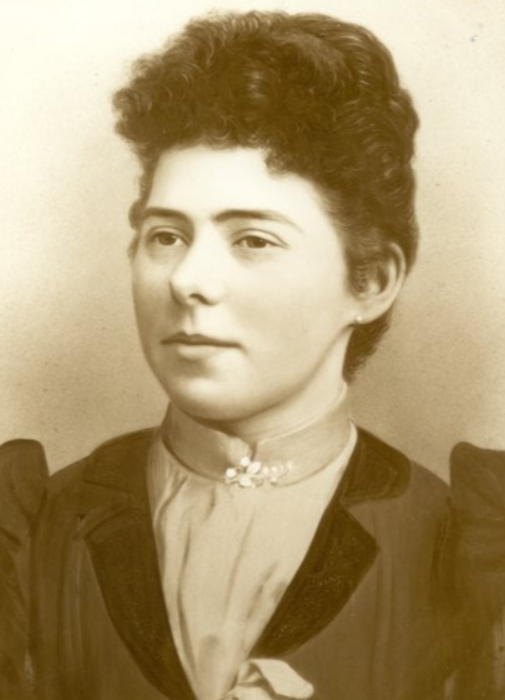
Annie, my great grandmother, was born 2 Jan 1871 in Merstow Green, Evesham, Worcestershire. Her father Fred Stokes was a wheelwright. On the 1771 census in Merston Green Annie was 3 months old and there was quite a houseful: Annies parents Fred and Rebecca, Fred’s parents Thomas and Eliza and two of their daughters, three apprentices, a lodger and one of Thomas’s grandsons.
1771 census Merstow Green, Evesham:

Annie at school in the early 1870s in Broadway. Annie is in the front on the left and her brother Fred is in the centre of the first seated row:
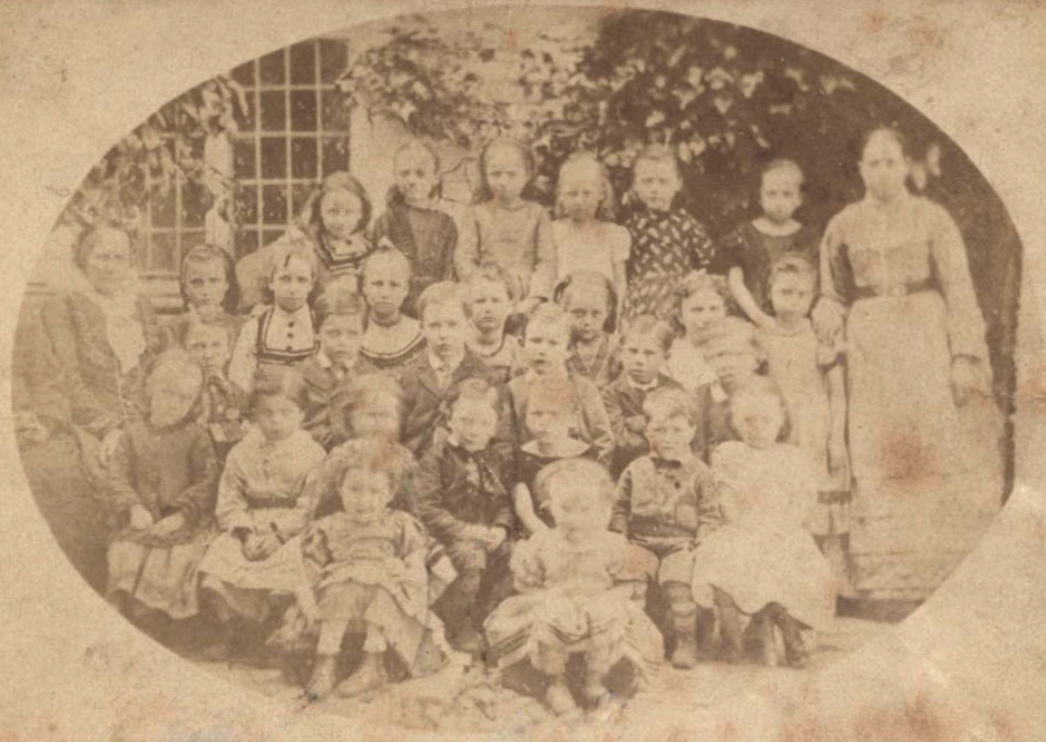
In 1881 Annie was a 10 year old visitor at the Angel Inn, Chipping Camden. A boarder there was 19 year old William Halford, a wheelwright apprentice. John Such, a 62 year old widower, was the innkeeper. Her parents and two siblings were living at La Quinta, on Main Street in Broadway.
According to her obituary in 1962, “When the Maxton family visited Broadway to stay with Mr and Madame de Navarro at Court Farm, they offered Annie a family post with them which took her for several years to Paris and other parts of the continent.”
Mary Anderson was an American theatre actress. In 1890 she married Antonio Fernando de Navarro. She became known as Mary Anderson de Navarro. They settled at Court Farm in the Cotswolds, Broadway, Worcestershire, where she cultivated an interest in music and became a noted hostess with a distinguished circle of musical, literary and ecclesiastical guests. As in the years when Mary lived there, it was often filled with visiting artists and musicians, including Myra Hess and a young Jacqueline du Pré. (via Wikipedia)
Court Farm, Broadway:
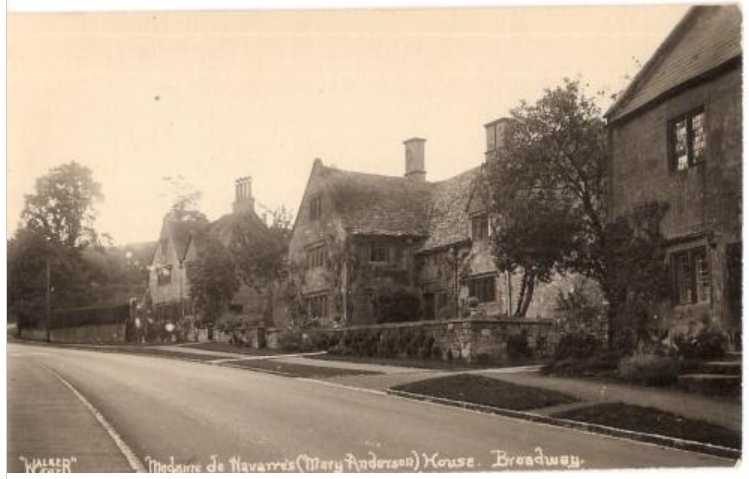
Annie was an assistant to a tobacconist in West Bromwich in 1991, living as a boarder with William Calcutt and family. He future husband Albert was living in neighbouring Tipton in 1891, working at a pawnbroker apprenticeship.
Annie married Albert Parker Edwards in 1898 in Evesham. On the 1901 census, she was in hospital in Redditch.
By 1911, Anne and Albert had five children and were living at the Cricketers Arms in Redditch.
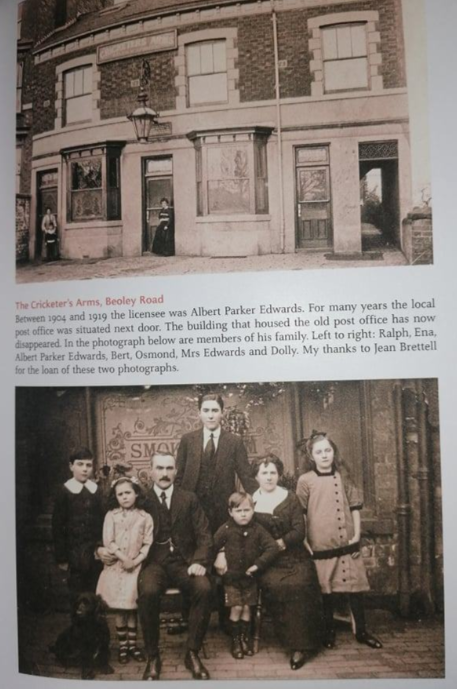
Behind the bar in 1904 shortly after taking over at the Cricketers Arms. From a book on Redditch pubs:
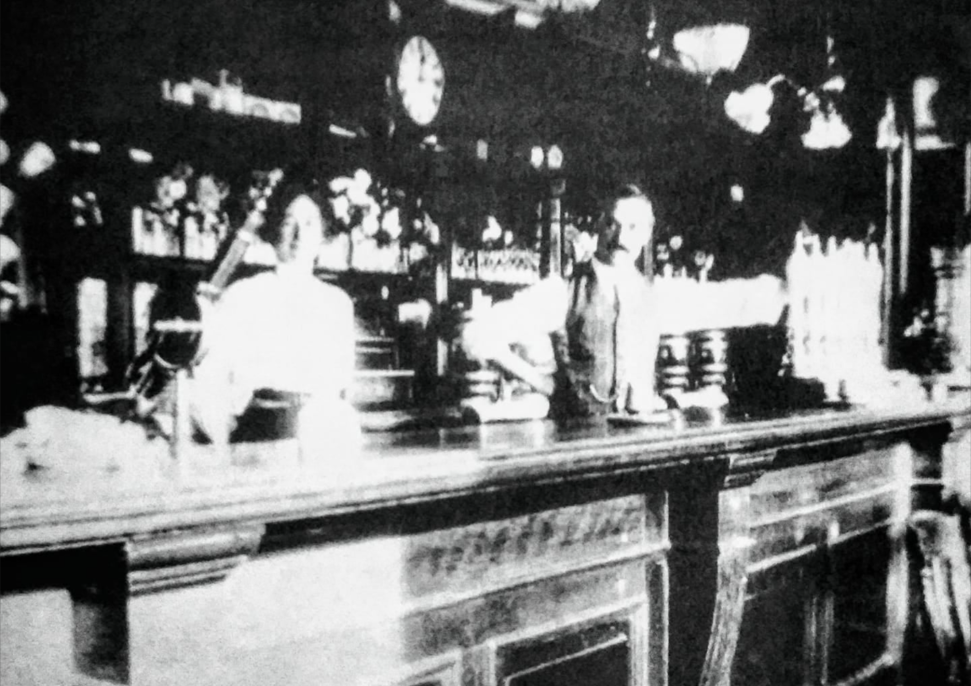
Annie was referred to in later years as Grandma E, probably to differentiate between her and my fathers Grandma T, as both lived to a great age.
Annie with her grandson Reg on the left and her daughter in law Peggy on the right, in the early 1950s:
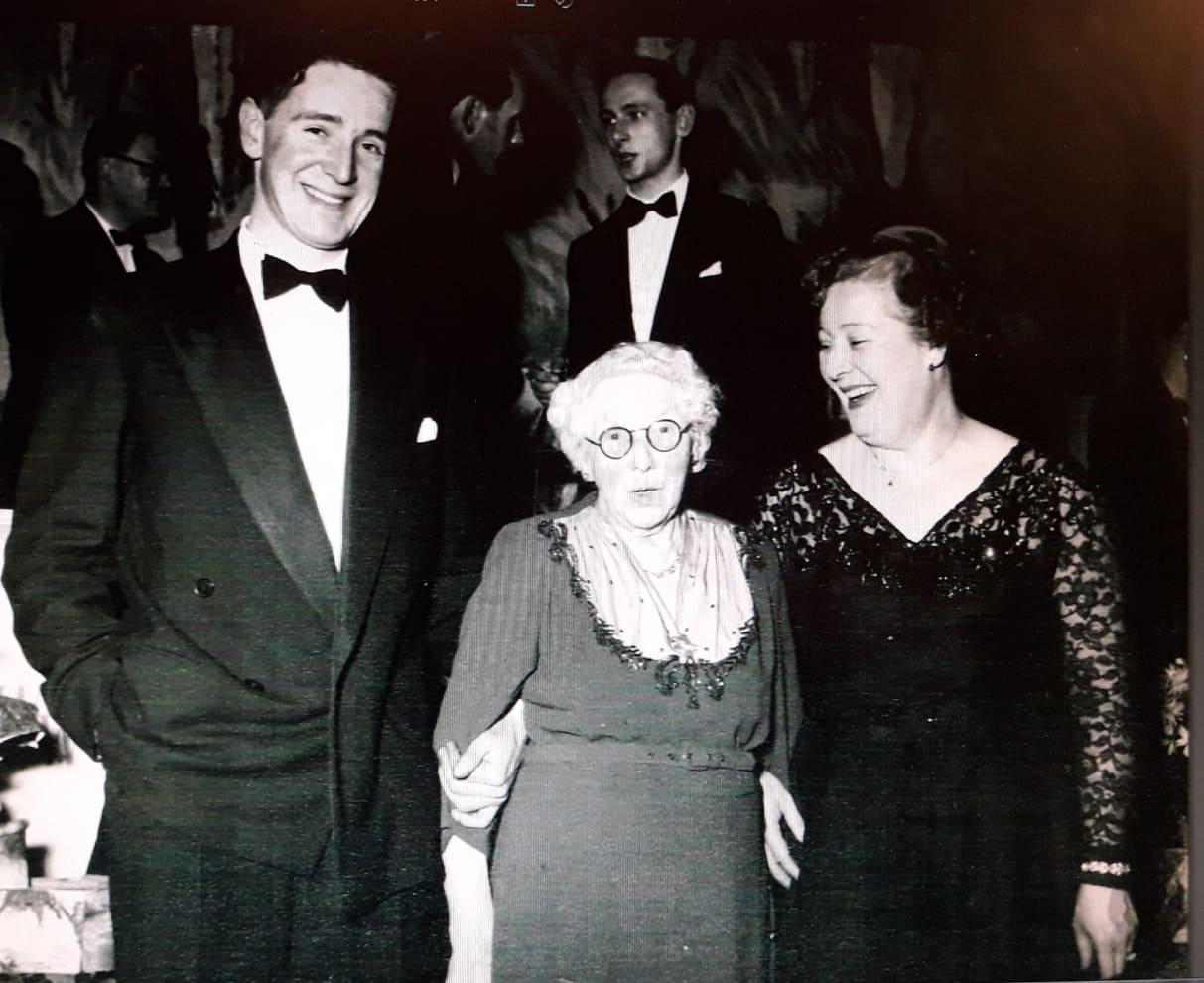
Annie at my christening in 1959:
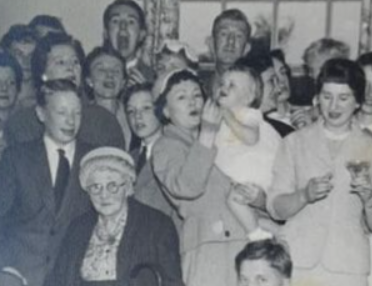
Annie died 30 Dec 1961, aged 90, at Ravenscourt nursing home, Redditch. Her obituary in the Droitwich Guardian in January 1962:
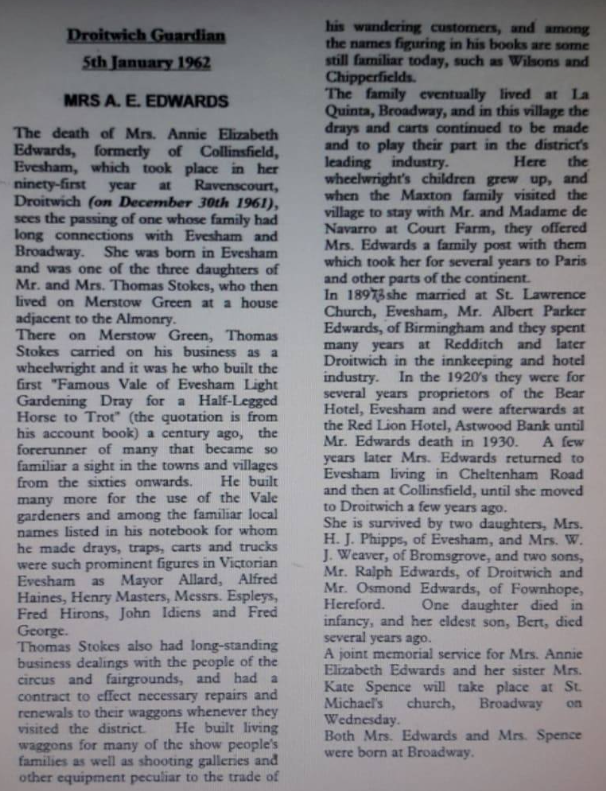
Note that this obituary contains an obvious error: Annie’s father was Frederick Stokes, and Thomas was his father.
September 10, 2022 at 6:08 pm #6327In reply to: Scrying the Word Cloud
paul elderly barbara noted window bottom
sand somewhere car
feel proudly
tip gloria alice andrew aren
scared woods
offer ceremony pounds
-
AuthorSearch Results